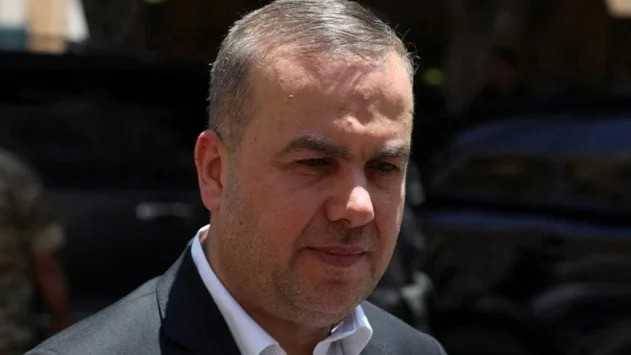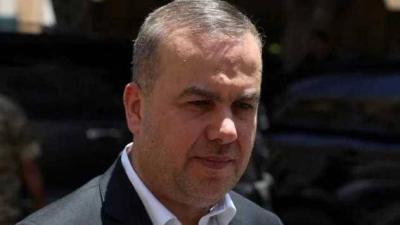In light of the accumulation of crises Lebanon is experiencing, particularly political and security crises, attention is directed towards Hezbollah as one of the key players. How does the party approach these issues? Member of the "Loyalty to the Resistance" bloc, MP Hassan Fadlallah, reveals that "Hezbollah has not received any French or other initiatives, especially since it is not the direct party concerned with receiving initiatives." He states that while he does not "foresee the possibility of a wide war against Lebanon," he emphasizes that "an assessment is one thing, and reality is another, and he builds his actions on this basis."
Regarding the presidential situation, Fadlallah does not hide in an interview with "Al-Anbaa" electronic newspaper that "the presidential horizon remains blocked for now, especially with the absence of an agreement on the required parliamentary majority." As for the displacement issue, he clarifies that "this file needs a national, humanitarian approach away from incitement."
Full text of the interview:
**Q:** After the visit of French Foreign Minister Stéphane Séjourné, was there communication with Speaker of the Parliament Nabih Berri regarding what was discussed? Has there been any direct or indirect communication between the French minister and Hezbollah? What is Hezbollah's response to what was leaked in the media about the terms of the agreement? How does this paper differ from previous ones?
**A:** There is ongoing communication between us and the Speaker of the Parliament, regardless of meetings with foreign delegations, and there is consultation on various issues, primarily how to confront the Israeli aggression against our country. We do not comment on media leaks, and we have no knowledge of any agreement terms because no agreement has been made with anyone, and we are not the party concerned with receiving papers or initiatives; the Lebanese state through the government and Speaker Berri is responsible for official meetings. We are in consultation to achieve the best interest for Lebanon, especially since it is in a strong position that is taken into account, and it is one of the key countries concerned with what is happening in Gaza, with results affecting it, and it has become a voice that is heard, due to what the southern front has presented in terms of the regional presence of our country. There are fundamental rules governing our position regarding the current war, based on the equation of stopping aggression against Gaza, to establish a supportive front. After stopping that aggression, there should be serious discussions on how to address the repeated Israeli violations of Lebanese sovereignty, as the Zionist entity is the occupier and aggressor, and Lebanon is in a position of self-defense. The next phase in southern Lebanon will be determined by the Lebanese based on protecting Lebanon and not infringing its sovereignty. We have an equation that has proven successful, which is the army, the people, and the resistance, and we reject any Israeli impositions or conditions on our country, noting that the enemy entity is not in a position to impose conditions. Our country is strong and capable of enforcing the equation that provides it with protection.
**Q:** In light of the escalation by the Israeli enemy and the corresponding response from the resistance, do the matters go beyond where they currently stand? What is the party's capability for retaliation or even attack?
**A:** We have set a primary goal, which is to support Gaza by applying pressure on the northern front of the enemy to stop this massacre against the Palestinian people. What we have achieved thus far is very significant, and the sacrifices we have made in terms of our people's blood and livelihoods are for a sacred humanitarian cause. In the face of the horrifying massacre in Gaza, there is no place for neutrality or watching; every person with a humanitarian conscience must take an influential and effective stance to support the children of Gaza, especially against an enemy that will not hesitate to repeat its crimes against other countries, including Lebanon, if it achieves its goals in Gaza. In this position, we express our true humanity and defend the right to a decent life and the future of our children, so that the scenes of Gaza are not repeated. What we want is to stop the aggression, not to expand it into a widespread war. Our political and field reading does not see the possibility for the enemy to launch a large-scale war, but we do not base our actions on this assumption; an assessment is one thing, and actions are another. The resistance has completed preparations for any emergency, and it is ready for all possibilities, having considered all scenarios, and the enemy no longer has the element of surprise that it once used against Arab countries, because we surprised it before it could surprise us.
**Q:** The Israeli threat has retreated in the past two days regarding the invasion of Rafah in favor of negotiations' activity; what are the implications of an agreement in Gaza, and how will it affect Lebanon?
**A:** The negotiations are managed by Hamas in coordination with the resistance factions in Palestine. They have legitimate and just demands, especially concerning the return of residents from northern Gaza and the withdrawal of the enemy. The invasion of Rafah will not change the battlefield landscape except to commit massacres and destruction; the enemy's situation will not be better than what happened in Khan Younis or elsewhere. Our indicators show that the resistance in Gaza is capable of continuing operations and confronting the Zionist barbarity, and the enemy will not emerge from this war victorious, but shattered militarily and politically. Regarding southern Lebanon, when you stand in Gaza, you stand in Lebanon, and any Israeli aggression will be responded to proportionately.
**Q:** The presidential entitlement remains stagnant; did the French foreign minister address this file in Beirut? What about the quintet's efforts? Are all initiatives currently void while waiting for Gaza?
**A:** The stagnation is due to the inability of any side to secure the required constitutional parliamentary majority to elect its candidate. We have tried several sessions but did not reach a conclusion, and therefore we supported dialogue initiatives, expressing our full readiness to engage in dialogue and present our point of view, which is what the ambassadors of the quintet and the "National Moderation" bloc have conveyed to us. It is natural when there is dialogue in the council called for by Speaker Berri that it be presided over by him. The ones who have rejected and obstructed initiatives were those who rejected dialogue, even before the war on Gaza. We are with electing a president today rather than tomorrow, but the horizon remains closed due to the absence of an agreement that secures the required parliamentary majority; the approach must be national and stem from domestic will. If the Lebanese do not help themselves, no one can assist them.
**Q:** The party still supports the head of the Marada Movement, Sleiman Franjieh, while there are international and regional efforts to propose a third name; can the party respond to these proposals?
**A:** We support a natural candidate who has a clear presence and policy, a national role, and the ability to connect with the majority of the Lebanese. We do not impose our opinion on anyone but express our conviction. Others have set a goal of preventing his election because he does not resemble their project and their incendiary rhetoric. The country needs a president who has national convictions, clear positions, and the capability to deal with challenges, and this is what we have seen in candidate Franjieh. The other names that were proposed aimed to cut off the path to Franjieh; we have not yet heard a convincing reason for rejecting him other than that he belongs to a different school than theirs. Is this reason sufficient for his rejection?
**Q:** The Syrian displacement has become a "ticking time bomb," and the party warned from the beginning of the war in Syria of a displacement crisis. Are there efforts by Hezbollah with Syria to resolve this file, and how can it be addressed from your perspective?
**A:** This file is significantly intertwined with Western, American, and European interests as it has been used as a pressure tool against Syria. The so-called international community wants to maintain control over this card at the expense of Lebanon, and this requires a firm official stance and refusing to accept their continued presence on its territory due to the heavy burden it presents. Political resolution must come through concrete steps; the first necessary step is serious and effective official communication between the Lebanese and Syrian governments to find a common approach. We have long called for and sought this with officials. Everyone knows our position on the displacement file; Hezbollah has created a special file and worked to facilitate the return of convoys to Syria. This file needs a national and humanitarian approach away from incitement, and as much as we strive for the return of the displaced, we reject racist practices and violations against them. We have laws that can be applied.




